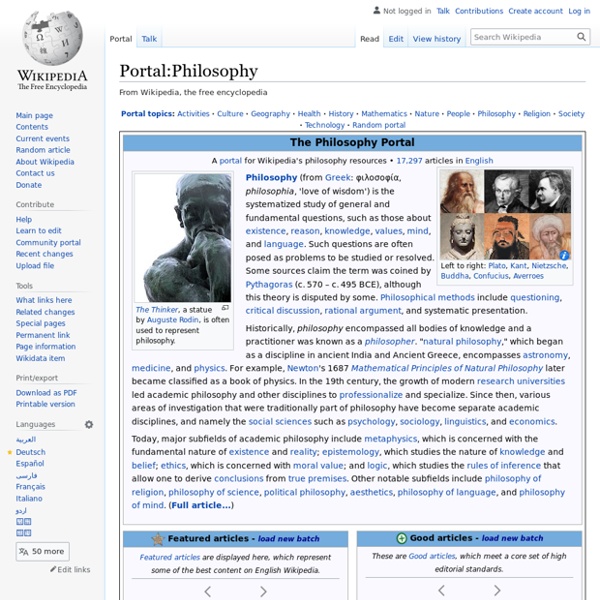FISP : Fédération Internationale des Sociétés de Philosophie
Outline of self
Self – individual person, from his or her own perspective. To you, self is you. To a different person, self is that person. Life stages/events[edit] Stages of life[edit] Major life events[edit] Individual rights[edit] Individual rights – much of the western world values the concept of individual rights. Security rights – protect people against crimes such as murder, massacre, torture and rape Security of person – liberty, including the right, if one is imprisoned unlawfully, to the remedy of habeas corpus. Components of self[edit] Personality traits[edit] Main articles: Big Five personality traits and Trait theory Harmful traits and practices[edit] Personal values[edit] Virtues[edit] Virtue – characteristic of a person which supports individual moral excellence and collective well being. Vices[edit] Main articles: Vice and Sufism Self-actualization[edit] Self-actualization – Self management[edit] Self-management – Self-preservation and self-maintenance[edit] Other personal concepts[edit] See also[edit]
Portal:Metaphysics
What is the meaning of life?What is the nature of reality?What is humanity's place in the universe?Does the world exist outside the mind?What is the nature of objects, events, places?Is there any existance of spirit,and can the spirit manifest itself without body? Ludwig Josef Johann Wittgenstein (26 April 1889 – 29 April 1951) was an Austrian-Britishphilosopher who worked primarily in logic, the philosophy of mathematics, the philosophy of mind, and the philosophy of language. He helped inspire two of the century's principal philosophical movements: the Vienna Circle and Oxford ordinary language philosophy. Purge server cacheCite error: There are <ref> tags on this page, but the references will not show without a {{reflist}} template (see the help page).
SFP - Société française de philosophie - Présentation
Lists of people
Lists of people From Wikipedia, the free encyclopedia Jump to: navigation, search Contents [hide] By name[edit] By nationality, ethnicity, or location[edit] Main article: Lists of people by nationality By belief[edit] Lists of people by belief By associated physical condition or characteristic[edit] Lists of people by cause of death By condition[edit] By occupation[edit] By scholar area[edit] By achievement or status[edit] By circumstance[edit] Real people appearing in fiction[edit] Content listings Lists Indices Retrieved from " Categories: Hidden categories: Use dmy dates from May 2013 Navigation menu Personal tools Namespaces Variants Views Actions Navigation Interaction Tools Print/export Languages This page was last modified on 4 April 2014 at 22:02.
Portal:Aesthetics
From Wikipedia, the free encyclopedia Classicism, in the arts, refers generally to a high regard for classical antiquity, as setting standards for taste which the classicists seeks to emulate. The art of classicism typically seeks to be formal and restrained. Classicism is a force which is often present in post-medieval European and European influenced traditions, however, some periods felt themselves more connected to the classical ideals than others, particularly the Age of Reason, the Age of Enlightenment and some movements in Modernism. Arthur Coleman Danto (born 1924) is an American art critic, and professor of philosophy. Danto was born in Ann Arbor, Michigan, in 1924, and grew up in Detroit. Baumgarten appropriated the word aesthetics, which had always meant sensation, to mean taste or "sense" of beauty. Purge server cache
Assembled Philosophers
Category:Humans
Subcategories This category has the following 22 subcategories, out of 22 total. Pages in category "Humans" The following 41 pages are in this category, out of 41 total. This list may not reflect recent changes (learn more).
Portal:Ethics
Justice is the concept of moral rightness based on ethics, rationality, law, natural law, fairness, religion and/or equity.[1] 3 Stages of Sin Reference: Psalm 1 1) See / Hear (Steps of Wicked) 2) Stand (Way of Sinners) 3) Sit (Seat of Mockers) Author: Holy Spirit Purge server cacheCite error: There are <ref> tags on this page, but the references will not show without a {{reflist}} template (see the help page).
Philosophical Quotes, Thought-Provoking Sayings
Related Quotes Hmmm Philosophy Truth Wise Words We are more often treacherous through weakness than through calculation. ~François VI de la Rochefoucault A man with one watch knows what time it is; a man with two watches is never quite sure. Begin at the beginning... and go on till you come to the end: then stop. Believe those who are seeking the truth; doubt those who find it. Beware lest you lose the substance by grasping at the shadow. Only that in you which is me can hear what I'm saying. I am a part of all that I have met. There's more to the truth than just the facts. The obscure we see eventually. Even a clock that does not work is right twice a day. Losing an illusion makes you wiser than finding a truth. If a man who cannot count finds a four-leaf clover, is he lucky? We are all but recent leaves on the same old tree of life and if this life has adapted itself to new functions and conditions, it uses the same old basic principles over and over again. The obstacle is the path.
Stanford Encyclopedia of Philosophy
Philagora, ressources culturelles
PHILOSOPHY POSTERS by Max Temkin | News | Design | Arts | Tech | Entertainment | Latest News | The Skunk Pot
Philosophy is the study of general and fundamental problems, such as those connected with existence, knowledge, values, reason, mind, and language. Philosophy is distinguished from other ways of addressing such problems by its critical, generally systematic approach and its reliance on rational argument. The word “philosophy” comes from the Greek φιλοσοφία (philosophia), which literally means “love of wisdom“. In this case, Max Temkin, the artist, wanted to create posters with quotes that motivated people to think ‘different‘. More about Max Temkin’s philosophy posters Also check out AMAZING SLEEPING BABIES PHOTOGRAPHY and MAPPING STEREOTYPES



